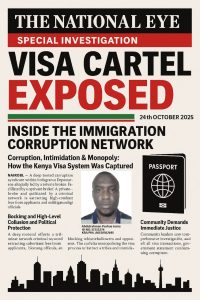Investigations
“I Contribute Sh4 Million Every Weekend”: Immigration Boss Evelyne Cheluget Exposed in Explosive Visa Cartel Scandal as Somali Community Delivers Damning Evidence to Authorities
At the operational heart of this alleged criminal enterprise sits Abdulrahman Pashua Juma, a private operator running his visa referral ring from the coastal city of Mombasa, specifically from the upscale Nyali area.
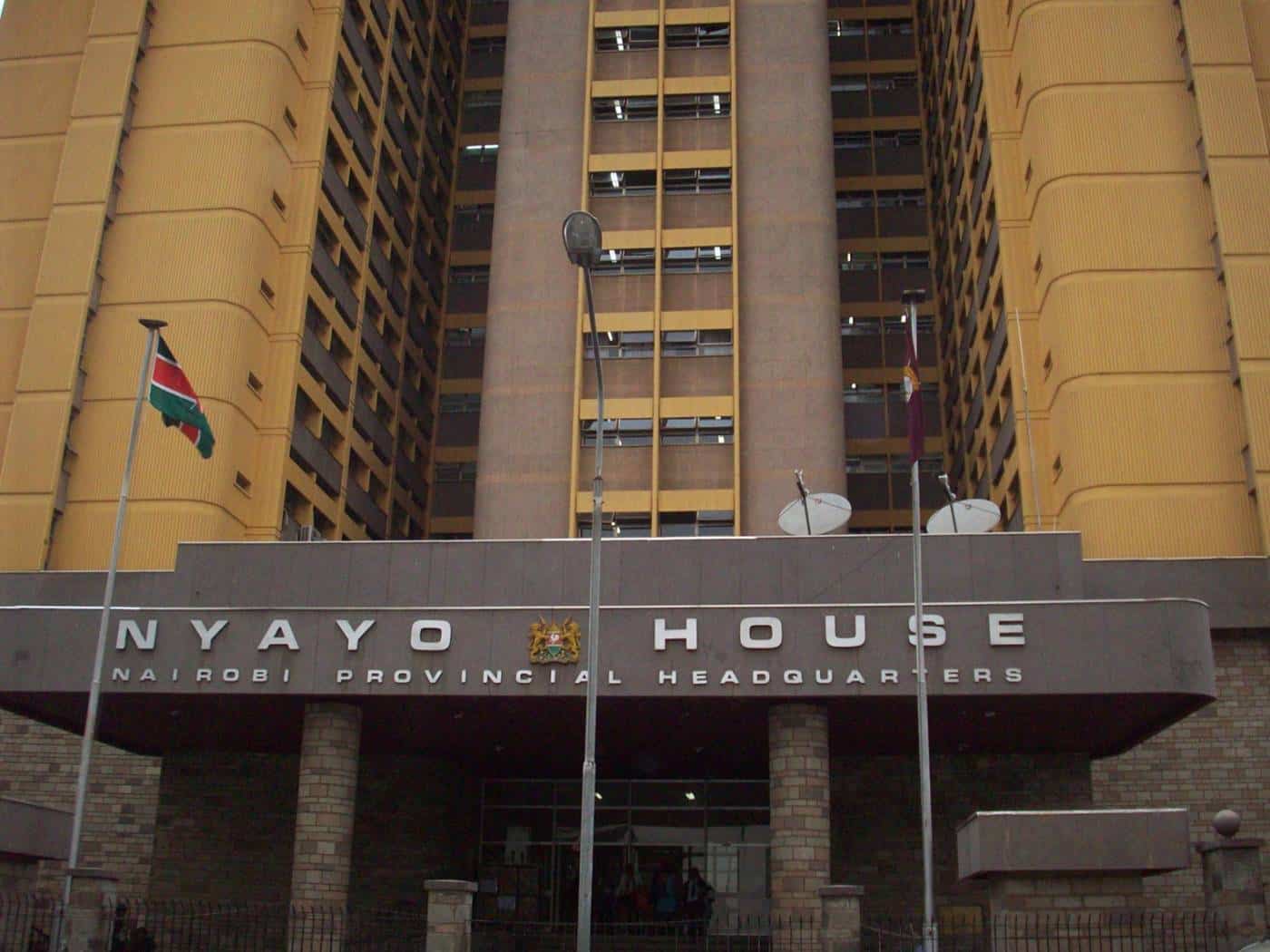
Explosive allegations of systematic extortion, political fundraising schemes, and ethnic exploitation rock Kenya’s Immigration Department as whistle-blowers reveal how a once-trusted public service has been transformed into a cash-generating machine for political elites and private cartels.
The corridors of Nyayo House, that imposing bureaucratic fortress in Nairobi’s central business district, have witnessed countless scandals over the decades.
But few compare to the explosive allegations now threatening to bring down the leadership of Kenya’s Department of Immigration Services.
At the center of the storm sits Director General Evelyne Cheluget, accused by the Somali Community Task Group on Immigration Transparency of making a stunning admission that has sent shockwaves through both the immigrant community and government watchdog agencies.
According to multiple visitors to her office, Cheluget allegedly declared without hesitation that she contributes a staggering four million shillings every weekend to the government, ostensibly for campaign purposes.
The statement, casual in its delivery yet catastrophic in its implications, suggests that visa revenue streams meant to serve legitimate applicants have been weaponized as political fundraising apparatus and personal enrichment schemes operating under the protective umbrella of state authority.
Reports have uncovered a sophisticated corruption network that makes the standard Kenyan bribery scandal look amateurish by comparison.
This is not about a rogue officer pocketing a few thousand shillings at a service counter.
This is industrial-scale exploitation of vulnerable migrants, systematic manipulation of government systems, and the apparent transformation of a critical national security function into what amounts to a private franchise operation.
At the operational heart of this alleged criminal enterprise sits Abdulrahman Pashua Juma, a private operator running his visa referral ring from the coastal city of Mombasa, specifically from the upscale Nyali area.
Juma has allegedly constructed a seamless machine that processes over 1,200 visa applications weekly, predominantly from Somali nationals desperate to regularize their status or facilitate family reunification and business travel.
The economics of this operation are breathtaking in their audacity and profitability.
Where the official government visa fee stands at a modest 34 US dollars, approximately 4,391 Kenyan shillings, Juma’s cartel charges between 185 and 195 dollars per application, translating to between 23,897 and 25,175 shillings. The markup represents a nearly 500 percent inflation over legitimate government charges. With 1,200 applications moving through this pipeline every seven days, conservative estimates place weekly illegal collections at 234,000 US dollars, roughly 30.2 million Kenyan shillings. Extrapolated across a month, this criminal enterprise generates approximately 120.8 million shillings. Annually, the figures become almost incomprehensible, potentially exceeding 1.4 billion shillings in illegal revenue extracted from one of Kenya’s most economically marginalized communities.
The sophistication of the operation extends far beyond simple overcharging. Digital forensic evidence submitted to investigating authorities reveals that hundreds of visa applications originate from identical IP addresses and a mere six email accounts, all traced back to devices and accounts controlled by Juma himself.
This centralized application process violates not only immigration procedures but potentially breaches the Computer Misuse and Cybercrimes Act of 2018, as applicants’ personal documents, passport copies, and photographs are collected via WhatsApp and uploaded without explicit informed consent or direct participation by the actual visa seekers.
The system operates with military precision. Somali applicants, many of them small business owners, students, or family members seeking legitimate travel documents, are funneled through a network of agents including Abdiaziz Ibrahim and Mohamed Salah Igge, who present themselves as officially sanctioned facilitators.
Applicants hand over their documents and payments, often transmitted through M-Pesa mobile money transfers to maintain a veneer of legitimacy and create transaction records that superficially appear clean.
The agents assure applicants that the inflated fees reflect new government policy or special processing charges.
Those who question the amounts or demand official receipts face intimidation tactics that weaponize ethnic prejudice and security concerns, with threats that their applications will be rejected or that they will be reported to National Intelligence Service operatives as security risks.
The protection afforded to this cartel reaches into the highest echelons of the Immigration Department. Director General Cheluget stands accused of personally taking control of the Visa Section, restricting access to what whistle-blowers describe as a small clique of loyal officers while systematically sidelining experienced professionals who refused to participate in the scheme.
Officers David Kinyua, Kevo, and Oyancha, all of whom previously held visa approval authority, were reportedly stripped of their system access after declining to cooperate with the referral network.
Other seasoned immigration officers including Wafula, Njenga, Wanguthi, Meshack, and Joan have been locked out of the PISCES system, the primary database for tracking border movements and visa issuance, and reassigned to administrative roles far removed from operational decision-making.
The operational leadership of the visa corruption scheme allegedly involves John Ndegwa, identified as the officer in charge of visa operations, Richard Chesang serving as acting deputy, and Shem Ateka, described as a liaison officer with the National Intelligence Service.
The involvement of an NIS liaison in this alleged corruption network raises particularly disturbing national security implications, suggesting that intelligence apparatus meant to protect Kenya from threats may have been compromised or co-opted to shield criminal activity.
Community sources interviewed by Kenya Insights paint a picture of systematic exploitation that goes beyond financial theft.
The Somali community in Kenya, estimated at several hundred thousand people including refugees, economic migrants, and Kenyan citizens of Somali heritage, has long navigated complex bureaucratic systems to maintain legal status.
Many operate legitimate businesses in sectors ranging from telecommunications to real estate, contributing significantly to Kenya’s economy particularly in Nairobi’s Eastleigh neighborhood and coastal trading hubs.
The visa referral system should serve as a straightforward administrative process.
Instead, it has become a chokepoint where vulnerable applicants face a choice between paying extortionate fees to connected agents or risking indefinite delays, outright rejections, or worse, being flagged as security concerns.
The financial breakdown of the cartel’s operations reveals the staggering inequality within the corruption network itself.
According to the whistle-blowers’ third communication to authorities, Juma personally captures approximately 40 US dollars per visa case from the 175-dollar total he collects, which includes the 34-dollar government fee.
This means Juma alone extracts roughly 48,000 dollars weekly, about 6.2 million shillings, from his coordination role. The actual immigration officers processing the applications including Martin, Lucy, Shem Ateka, John Ndegwa, and Richard Chesang receive comparatively minimal compensation despite spending entire workdays clearing data and pushing applications through official systems.
This wage structure ensures the officers remain dependent on the cartel while Juma and presumably higher-level political beneficiaries capture the lion’s share of illegal proceeds.
The alleged statement by Director General Cheluget about contributing four million shillings every weekend to government campaign activities represents perhaps the most explosive element of this scandal.
If accurate, this admission transforms the visa corruption from a criminal enterprise into a political financing scheme that potentially implicates figures far beyond the Immigration Department.
Kenya’s campaign finance regulations, already weakly enforced, would be rendered completely meaningless if public officials openly convert government service revenues into political war chests.
The statement also raises urgent questions about which political campaigns or which government officials benefit from these weekend contributions, and whether this practice extends beyond immigration services into other revenue-generating government departments.
The Somali Community Task Group on Immigration Transparency has not limited its allegations to internal government channels.
In a strategic escalation that demonstrates sophisticated advocacy, the group has disseminated comprehensive evidence packages to opposition political parties including the Democratic Congress Party, Jubilee Party, and Wiper Democratic Movement, ensuring that the scandal becomes politically toxic for the current administration.
Civil society organizations, human rights monitors, and community elders have also received full documentation, creating multiple pressure points that make this scandal difficult to contain through traditional government suppression tactics.
The evidence package assembled by the whistle-blowers is comprehensive and appears designed to withstand legal scrutiny.
It includes WhatsApp and Telegram screenshots showing agents coordinating document collection and fee negotiations, M-Pesa transaction records demonstrating the flow of funds from applicants through intermediaries, duplicate visa logs revealing the centralized application process from identical IP addresses, and witness testimonies from both affected applicants and immigration staff willing to break ranks.
This multi-layered documentation approach suggests the involvement of individuals with legal expertise or investigative experience, rather than simply aggrieved community members acting spontaneously.
The whistle-blowers have demanded specific remedial actions that demonstrate their sophistication and determination.
They seek immediate suspension and investigation of all officers named in their complaint, a comprehensive forensic audit of visa transactions processed between June and October 2025 from both Nyayo House in Nairobi and the Nyali office in Mombasa, formal investigation into the alleged four million shilling weekend contribution claim, public clarification from the Director General’s office to restore institutional credibility, review and audit of all visa referral procedures including email logs and payment records, and critically, guarantees of protection for all whistle-blowers and witnesses who have come forward.
The jurisdiction for investigating these allegations spans multiple agencies, each bringing distinct expertise and authority.
The Directorate of Criminal Investigations holds primary responsibility for criminal probe into fraud, forgery, and corruption offenses.
The Ethics and Anti-Corruption Commission possesses mandate to investigate abuse of office and corruption by public officials, with powers to recommend prosecution and asset recovery.
The National Intelligence Service, despite having a liaison officer allegedly implicated in the scheme, maintains national security oversight responsibilities particularly given the manipulation of systems meant to screen visa applicants for security threats.
The Attorney General’s office will ultimately determine prosecution strategy if evidence substantiates criminal charges.
The political dimensions of this scandal extend beyond immediate corruption allegations.
Kenya’s relationship with its Somali population, both citizens and refugees, has long been complex and occasionally fraught with tension. Security operations targeting extremist elements have sometimes created broader community resentment when implemented without discrimination.
Economic success of Somali entrepreneurs in certain sectors has generated both admiration and resentment from other communities.
The visa corruption scandal weaponizes these existing tensions, with whistle-blowers alleging that ethnic prejudice is deliberately invoked to intimidate applicants who question inflated fees or demand accountability.
Agents reportedly suggest that Somali applicants who complain risk being labeled security threats, exploiting post-Westgate and post-Garissa University attack anxieties to maintain silence and compliance.
The institutional damage to Kenya’s Immigration Department may prove the most lasting consequence of this scandal. Public trust in government services, already severely eroded by decades of petty corruption and bureaucratic dysfunction, takes years to rebuild once shattered by revelations of systematic abuse.
International implications also loom large. Kenya positions itself as a regional diplomatic hub and East African economic anchor. Foreign investors, international organizations, and diplomatic missions all rely on functional immigration systems for staff rotations, business travel, and program implementation.
Evidence that visa issuance has been corrupted by political fundraising schemes and ethnic exploitation undermines Kenya’s claim to stable governance and rule of law.
The response from the Immigration Department and relevant government agencies will determine whether this scandal becomes a watershed moment for accountability or simply another chapter in Kenya’s long history of impunity for well-connected corruption.
The whistle-blowers have set a fourteen-day deadline for formal acknowledgment and action updates, a timeline designed to maintain pressure while allowing reasonable opportunity for preliminary investigation.
Their strategic decision to simultaneously approach opposition politicians, civil society organizations, and media outlets creates multiple accountability mechanisms operating in parallel, making it difficult for government officials to employ the traditional Kenyan playbook of silence, delay, and eventual abandonment of investigations.
The alleged involvement of a National Intelligence Service liaison officer in protecting this visa cartel raises profound questions about institutional integrity within Kenya’s security apparatus.
The NIS operates with significant autonomy and limited oversight, justified by national security imperatives.
If NIS personnel have indeed been compromised by corruption networks, the implications extend far beyond immigration fraud into potential vulnerabilities in counterterrorism operations, border security, and intelligence gathering.
Foreign intelligence partners including the United States, United Kingdom, and regional allies may reassess cooperation frameworks if Kenyan security institutions appear systemically compromised.
For the Somali community members who have courageously stepped forward as whistle-blowers, significant personal risks accompany their advocacy. Kenya’s witness protection mechanisms remain underdeveloped and chronically underfunded.
Previous high-profile corruption cases have seen whistle-blowers face harassment, job loss, physical intimidation, and in extreme cases, suspicious deaths.
The Task Group’s insistence on protection guarantees reflects hard-earned wisdom about the costs of challenging powerful corruption networks.
Their declaration that the community is not for sale and their explicit rejection of being used for illegal fundraising or corrupt business represents not just advocacy but an assertion of dignity and political agency by a marginalized group.
The financial scale of the alleged corruption warrants emphasis.
If the weekly collection of 30.2 million shillings is accurate and sustained, this single visa cartel generates more than five times the annual budget of many Kenyan county health departments. It exceeds the total yearly revenue of numerous small Kenyan municipalities.
The four million shillings allegedly contributed every weekend to government campaigns, if verified, totals over 200 million shillings annually from this source alone.
These are not trivial sums representing petty corruption.
These figures describe a systematic looting of vulnerable migrants transformed into a political finance machine that potentially corrupts democratic processes at the highest levels.
As this investigation unfolds, Kenya faces a moment of institutional reckoning. Director General Evelyne Cheluget must either convincingly refute these allegations with transparent evidence or face consequences that could include criminal prosecution, asset forfeiture, and imprisonment.
The Immigration Department requires comprehensive reform to prevent similar cartels from reconstituting under new leadership.
Political figures who may have benefited from weekend contributions must be identified and held accountable.
The Somali community deserves both justice for past exploitation and systemic reforms that prevent future abuse.
The whistle-blowers have fired the opening salvo in what promises to be a protracted battle between entrenched corruption and demands for accountability.
Whether Kenya’s institutions rise to meet this challenge or retreat into familiar patterns of impunity will reveal much about the nation’s commitment to rule of law, protection of vulnerable communities, and the fundamental principle that public office is a trust, not a franchise opportunity for personal and political enrichment.
The visa cartel scandal is not simply about immigration fraud.
It is about whether Kenya will permit its public institutions to be captured by criminal networks operating with political protection, or whether the rule of law retains sufficient strength to hold powerful officials accountable regardless of their connections.
The Somali Community Task Group on Immigration Transparency has thrown down the gauntlet. Now Kenya must decide whether to pick it up.
Kenya Insights allows guest blogging, if you want to be published on Kenya’s most authoritative and accurate blog, have an expose, news TIPS, story angles, human interest stories, drop us an email on [email protected] or via Telegram
-

 Investigations2 days ago
Investigations2 days agoVISA CARTEL EXPOSED: Community Leaders Demand Immediate Arrests as Immigration Boss Allegedly Boasts of Weekly Political Kickbacks
-

 Business1 week ago
Business1 week agoSafaricom’s Sh115 Trillion Data Breach Scandal: How Kenya’s Telecom Giant Sold Out 11.5 Million Customers
-
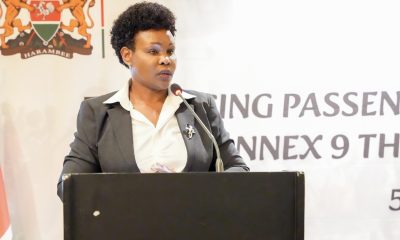
 Investigations3 days ago
Investigations3 days agoEXPOSED: The Visa Cartel Bleeding Kenyans Dry – How Immigration Boss Turned Government Office Into Personal Cash Cow
-

 Investigations6 days ago
Investigations6 days agoDEATH TRAPS IN THE SKY: Inside the Sordid World of West Rift Aviation’s Deadly Corruption Cartel
-

 Business2 weeks ago
Business2 weeks agoBillionaire: Inside Raila Odinga’s Vast Wealth
-
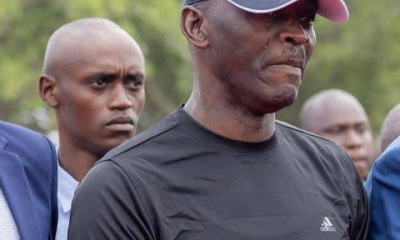
 News2 weeks ago
News2 weeks agoMaurice Ogeta, Raila’s Bodyguard: The Shadow Who Became The Story
-

 Business1 week ago
Business1 week agoWhy Kenyan Investors Should Pay Attention to the U.S. Stock Market (US30 Index)
-
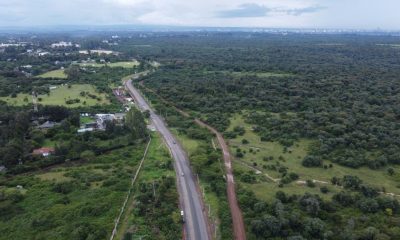
 News2 weeks ago
News2 weeks agoKeNHA Announces Six-Month Closure of Bomas–Kiserian Road to Pave Way for Drainage Upgrade

